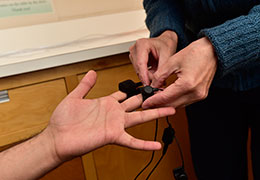Idaho State University's New Stress Management and Biofeedback Center Opens to Rave Reviews

Students who want to help manage stress and athletes who want to better understand their bodies can now visit Idaho State University's Stress Management Biofeedback Center.
The center was opened this fall by the Counseling and Testing Services, and the response has been overwhelmingly positive.
"The Biofeedback Center allows us to monitor our bodies' reaction to stress and how to effectively implement relaxation techniques," said Cameron Staley, psychologist at the Counseling and Testing Services who coordinates the Biofeedback Center.
Biofeedback services are free and only offered to currently enrolled ISU students.
Biofeedback utilizes instruments to measure biological signals such as heart rate, breathing, muscle activity, sweat, and temperature, to build important skills such as relaxation or tension reduction. Most of these natural biological signals are ignored by people until they develop a problem such as stress, anxiety or pain.
Through monitoring their body's reactions and after consistent practice of relaxation techniques participants are able to develop effective responses to stress. Some common goals of biofeedback are to improve awareness of participants mind and body; promote relaxation in response to stress; decrease tension, pain or emotional dysregulation; improve sleep and overall health; and reduce anxiety, stress or depression.
"We often start by teaching diaphragmatic breathing and helping students find their optimal breathing rate. This improves autonomic balance which promotes relaxation," Staley said. "Most of us are chest breathers which contributes to muscle tension and unnecessary sympathetic nervous system arousal. By modifying our breathing, we are able to reduce stress, anxiety, and calm our bodies."
The Biofeedback Center utilizes several software programs and interactive games to help individuals bring their thoughts, emotions and physical responses in balance by monitoring heart rhythms generated by optimal breathing.
The biofeedback lab also offers stress assessments.
"We have worked with athletes who benefit from completing a stress assessment. From the assessment, we are able to localize how they experience stress and develop ways to promote relaxation which enhances athletic performance," Staley said.
During the stress assessment participants are hooked up to a variety of sensors which monitor ways their body is responding to stressful situations. The participants engage in several somewhat stressful tasks like solving math problems and recalling stressful events.
"We've been flooded with people interested in biofeedback, "Staley said. "It's a great opportunity for students to learn skills before stress develops into panic or anxiety disorders. We all experience stress as a reaction to life. Learning stress management skills early on can prevent a lot of these problems from advancing."
More information on the Stress Management and Biofeedback Center
